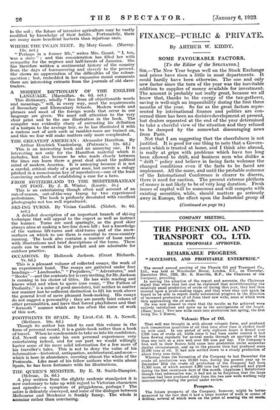Dr. Greaves, who is Professor of Agricultural Bacteriology in Utah
Agricultural College, has been guided in writing this useful work by the needs of his students. We cannot here discuss its technical merits, but so far as we have tested it we have found it alike clear and comprehensive. Dr. Greaves makes a good point in saying that bacteriologists have only just begun to realize the importance of studying beneficial ria ; most of our energy has hitherto been devoted to neutralizing the work of those which bring disease and decay. There is much still to be learnt about such organisms as those which deal, for instance, with the transformation of nitrogen •
in the soil ; the future of intensive agriculture may be vastly modified by knowledge of their habits. Fortunately, there are many more beneficial bacteria than injurious ones.



















































 Previous page
Previous page